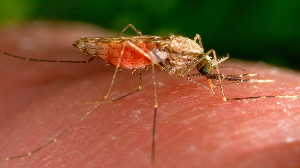Regional News of Tuesday, 11 July 2023
Source: Robert Tachie Menson, Contributor
Dormaa MCE, agricultural and CHED officers sensitise two communities on PFJs and PERD
Drissa Ouattara, the Dormaa Central Municipal Chief Executive led a team of agricultural and Cocoa Health and Extension Division officers in the Municipality to undertake a community engagement exercise at the Asunsu Dwen and Ntabene communities.
This was to sensitise farmers in these two communities about the Planting for Food and Jobs (PFJs), Planting for Export and Rural Development (PERD) and other government policy initiatives.
It was aimed at identifying, strategising, enlightening the rural dwellers of the two communities, a predominantly cocoa and cashew growing area, to the town's local economic development initiatives and plans, and harness all resources towards the effective implementation of government's PFJs and PERD flagship programmes, new methods in farming and how indigenes can fully tap into it to enhance and better their livelihoods.
The visit afforded the team a rare opportunity to interact with the farmers, and to know at first hand some of their challenges and evolve ways by the assembly body to find solutions to them.
He told them that government placed a lot of attention and focus in rural development where most of farm produce emanated from, and thus make it a matter of necessity, requirement and mandatory to prioritise the provision of basic social amenities such as roads, schools, police stations, hospitals, water and telecommunication networks in such localities.
Drissa said he is privy to information that the Bono Region is working with MTN, a telecommunication service provider to build transmitter at Danyame that would address telecommunication challenges or poor network experienced in parts of the Municipality when that project is completed, assuring the farmers another options on the table would be to connect them to the rural telephony network, and said he has taken the request for the provision of school and water supply to the area into consideration.
He expressed government's commitment and determination to support rural farmers and those in the cashew value chain towards the production of quality commodity for both the domestic and international market to earn foreign exchange for accelerated national development.
Cecilia Adomah Yeboah, the Municipal Director, Department of Agriculture, called for the formation and strengthening of farmers' association in the face of dwindling national resources and limited staff strength facing the directorate stressing, our officers can't attend to individual farmers concerns one after the other but "when you collectively unite and come together there are a lot of benefits you can derive and share experiences and learn from one another".
She advised them to strictly follow laid down procedures and rules prescribed by officers of the directorate to plant seedlings to increase yield and boost production indicating scaling up production levels in cashew and cocoa is dependent on how well the farmers utilised the advise and teachings given to them by the officers and not by the number of trees on the farm or the sheer size of the land or number of cashew or cocoa trees.
The Municipal Director added that new methods in farming were based on and informed by research, study and investigations and urged the farmers to make it a necessity to comply with new approaches and methods in farming to avoid huge expenditure and high cost in farm maintenance to make good use of little available as there was resource constraints.
Evelyn Appiah, an extension officer with the directorate, advised the farmers who were supplied with cashew seedlings to make good use of it, because the municipal assembly has incurred huge cost purchasing the seedlings, fertiliser and other chemicals to nurture the seedlings to planting size.
She asked them to plant spacing cashew seedlings 40 feet in distances apart in between each seedlings in a triangular form and shape, ensuring regular pruning of tree branches to allow adequate sunshine on the farm in new ways and methods of planting to achieve the desired results.
The extension officer urged them to maintain regular visits to farms and not to hesitate but immediately reach the directorate to report any unusual manifestation on their farms to enable them deal with the situation.
"The directorate will assist you to support to cultivate your pepper, okro and tomatoes in a cost effective manner. The cost of fertiliser is now ghc500 meaning you spend so much and you can make losses not seeking proper guidance and support from the directorate," he added.
Ernest Atta Kunu, the Pruning Coordinator, Cocoa Health and Extension Division (CHED), noted that the Municipality and Ghana as a whole is not meeting the production capacity and levels for cocoa due to a number of factors.
He cited the failure of farmers to adhere to the advice of CHED officers in planting, misapplication of chemicals and not pruning farms.
The pruning coordinator asked them to develop proper approach and the right mindset for their cocoa farming business as the beans survival hugely depends on a number of factors such as availability and circulation of air, insects, water and the farmer.
"An acre of land should produce between 10 to 12 bags of cocoa but people produce two, three and sometimes even half bags. Between 1500 to 1700 cocoa pods should produce a bag of cocoa.
"But today the poor application of chemicals is killing midgets the insects which aids the cocoa beans to mature," he added.
Atta Kunu stated that COCOBOD now gave out or distributed cocoa seedlings for plantation and cultivation on grounds that they know the size of one's farmland, plantain seedlings would be planted alongside the cocoa seedlings due to climate change which is negatively affecting cocoa farming.
He stated that Ghana's cocoa was previously recognised internationally as the best premium but it has lost this status to Cote d'Ivoire due to bad practices and poor methods employed in agriculture.
The pruning coordinator appealed to the farmers to form cooperatives to enable them get information and regular updates from CHED.











